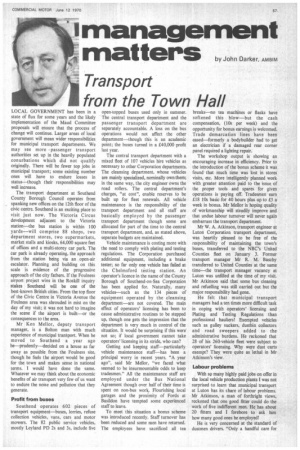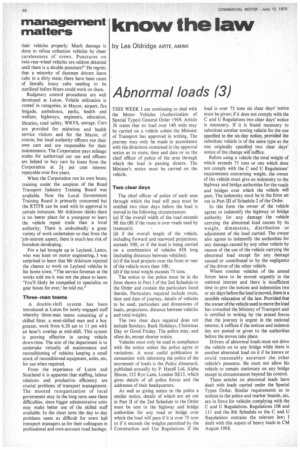management
Page 59

Page 60

If you've noticed an error in this article please click here to report it so we can fix it.
matters by John Darker. AMBIM
Transport from the Town Hall
LOCAL GOVERNMENT has been in a state of flux for some years and the likely implementation of the Maud Committee proposals will ensure that the process of change will continue. Larger areas of local government will mean wider responsibilities for municipal transport departments. We may see more • passenger transport authorities set up in the heavily populated conurbations which did not qualify originally. There will be fewer top jobs in municipal transport; some existing number ones will have to endure losses in status—though their responsibilities may well increase.
The transport department at Southend County Borough Council operates from spanking new offices on the 12th floor of the civic centre. Southend is an exciting place to visit just now. The Victoria Circus development adjacent to the Victoria station—the bus station is within 100 yards—will comprise 88 shops, two department stores, two supermarkets, market stalls and kiosks, 64,000 square feet of offices and a multi-storey car park. The car park is already operating, the approach from the station being via an open-air escalator. Planning and building on this scale is evidence of the progressive approach of the city fathers. If the Foulness airport project wins in the Roskill inquiry stakes Southend will be one of the best-known British cities. From the top floor of the Civic Centre in Victoria Avenue the Foulness area was shrouded in mist on the day of my visit; it was not hard to imagine the scene if the airport is built—or the consequences to the area.
Mr Ken Mellor, deputy transport manager, is a Bolton man with much experience of municipal trantport. When he moved to Southend a year ago he—prudently--decided on a house as far away as possible from the Foulness site, though he feels the airport would be good for the town and makes sense in national terms. I would have done the same. Whatever we may think about the economic benefits of air transport very few of us want to endure the noise and pollution that they generate.
Profit from buses Southend operates 602 pieces of transport equipment—buses, lorries, refuse collection vehicles, vans, cars and motor mowers. The 82 public service vehicles, mostly Leyland PD 2s and 3s, include five
open-topped buses used only in summer. The central transport department and the passenger transport department are separately accountable. A loss on the bus operations would not affect the other department—though this is an academic point; the buses turned in a £40,000 profit last year.
The central transport department with a mixed fleet of 107 vehicles hire vehicles as necessary to other Corporation departments. The cleansing department, whose vehicles are mainly specialized, nominally own them; in the same way, the city engineer owns the road rollers. The central department's charges, "at cost", enable reserves to be built up for fleet renewals. All vehicle maintenance is the responsibility of the transport department and all staff are basically employed by the passenger transport department though some are allocated for part of the time to the central transport department, and, as stated above, separate budgets are maintained.
Vehicle maintenance is costing more with the need to comply with plating and testing regulations. The Corporation purchased additional equipment, including a brake tester; so far only one vehicle has failed at the Chelmsford testing station. An operator's licence in the name of the County Borough of Southend-on-Sea Corporation has been applied for. Naturally, many vehicles—such as the 134 pieces of equipment operated by the cleansing department—are not covered. The main effect of operators' licensing has been to cause administrative routines to be stepped up, though one gets the impression that the department is very much in control of the situation. it would be surprising if this were not so; if local government cannot take operators' licensing in its stride, who can?
Getting and keeping staff—particularly vehicle maintenance staff—has been a principal worry in recent years. "A year ago", said Mr Mellor, "we faced what seemed to be insurmountable odds to keep tradesmen." All the maintenance staff are employed under the Bus National Agreement though over half of their time is spent on non-bus work. Flourishing local garages and the proximity of Fords at Basildon have tempted some experienced staff to leave.
To meet this situation a bonus scheme was introduced recently. Staff turnover has been reduced and some men have returned. The employees have sacrificed all tea breaks—no tea machines or flasks have softened this blow—but the cash compensation, (10s per week) and the opportunity for bonus earnings is welcomed. Trade demarcation lines have been eased—formerly a bodybuilder had to get an electrician if a damaged rear corner panel required a lighting repair.
The workshop output is showing an encouraging increase in efficiency. Prior to the introduction of the bonus scheme it was found that much time was lost in stores visits, etc. More intelligently planned work with greater attention paid to the issue of the proper tools and spares for given operations is paying off. Tradesmen earn £18 lOs basic for 40 hours plus up to £5 a week in bonus. Mr Mellor is hoping quality of workmanship will steadily improve and that undue labour turnover will never again embarrass the transport department.
Mr W. A. Atkinson, transport engineer at Luton Corporation transport department, was heartily pleased to be free of the responsibility of maintaining the town's buses, transferred to the NBC's United Counties fleet on January 3. Former transport manager Mr R. M. Baschy transferred to United Counties at the same time—the transport manager vacancy at Luton was unfilled at the time of my visit. Mr Atkinson said that some bus cleaning and refuelling was still carried out but the major responsibility had gone.
He felt that municipal transport managers had a ten times more difficult task in coping with operators' licensing and Plating and Testing Regulations than professional hauliers! Exempted vehicles such as galley suckers, dustbin collectors and road sweepers added to the administrative burdens. He reckoned that 28 of his 260-vehicle fleet were subject to operators' licensing. Why were dust carts exempt? They were quite as lethal in Mr Atldnson's view.
Labour problems
With SP many highly paid jobs on offer in the local vehicle production plants I was not surprised to learn that municipal transport at Luton has its share of labour problems. Mr Atkinson, a man of forthright views, reckoned that one good fitter could do the work of five indifferent men. He has about 20 fitters and I forebore to ask him how many good ones he employed!
He is very concerned at the standard of dustmen drivers. "Only a handful care for their vehicles properly. Much damage is done to refuse collection vehicles by sheer carelessness of crews. Punctures on twin-rear-wheel vehicles are seldom detected until there is a double puncture!" He regrets that a minority of dustmen drivers leave cabs in a dirty state; there have been cases of literally lousy cabs needing to be sterilized before fitters could work on them.
Budgetary control procedures are well developed at Luton. Vehicle utilization is costed in categories, ie Mayor, airport, fire brigade, ambulance, parks, health and welfare, highways, engineers, education, libraries, road safety, WRVS, sewage. Cars are provided for midwives and health service visitors and for the Mayor, of course, but local authority officers run their own cars and are responsible for their maintenance. The Corporation pays mileage scales for authorized car use and officers are helped to buy cars by loans from the Corporation at 2-1per cent interest repayable over five years.
When the Corporation ran its own buses, training under the auspices of the Road Transport Industry Training Board was available. Now the Local Government Training Board is primarily concerned but the RTITB can be used with its approval in certain instances. Mr Atkinson thinks there is no better place for a youngster to learn the vehicle repair trade than a local authority. There is undoubtedly a great variety of work undertaken so that from the 'job-interest aspect, there is much less risk of boredom developing.
For a lad brought up in Leyland, Lancs, who was keen on motor engineering, I was surprised to learn that Mr Atkinson rejected the chance to work on Leyland vehicles in his home town. "The service foreman at the works told me it was not the place to learn. `You'll likely be compelled to specialize on gear boxes for ever,' he told me."
Three—man teams A double-shift system has been introduced at Luton for newly engaged staff whereby three-man teams consisting of a skilled fitter, a semi-skilled man and a boy greaser, work from 6.30 am to 11 pm with an hour's overlap at mid-shift. This system is proving effective in saving vehicle down-time. The aim of the department is to undertake virtually all maintenance and reconditioning of vehicles keeping a small stock of reconditioned equipment, axles, etc, for use when required.
From the experience of Luton and Southend it is apparent that staffing, labour relations and productive efficiency are crucial problems of transport management. The mooted reorganization of local government may in the long term ease these difficulties, since bigger administrative units may make better use of the skilled staff available. In the short term the day to day problems seem as difficult for town hall transport managers as for their colleagues in professional and own-account road haulage.
























































































































